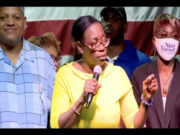Today is the third anniversary of SpeechNow.org v. FEC, the case brought by the Center for Competitive Politics (CCP) that created the ‘super PAC.’ So today is a good opportunity to review the importance of that case and what still needs to be done.
SpeechNow came about because of a fundamental unfairness in the Federal campaign finance laws that favored the speech of wealthy single individuals over groups of middle-class activists.
The courts have long recognized that political speech rights are “at the heart” of the First Amendment. After all, freedom of speech means very little if you cannot use your voice to criticize those in power. The legislatures are only allowed to regulate political speech very narrowly and with great care not to chill the speech of others.
As a result, political speech may only be limited in order to fight corruption or the appearance of corruption. Specifically, the courts have held that “corruption” means quid pro quo…money exchanged for a political favor. So long as a single person never coordinates with a candidate or officeholder and never substantially benefits from running the ad, he or she is free to do so. That’s how T. Boone Pickens was able to flood the airwaves with millions of dollars’ worth of advertisements backing his so-called “Pickens Plan” for energy independence during the 2008 election—well before the rise of the super PAC. Had he run similar ads encouraging people to vote for Pickens Plan backers, he could have just as easily done so.
The plaintiff in Citizens United—the corporate entity known as Citizens United—wanted the corporation to be treated the same way as T. Boone Pickens. The Supreme Court ultimately agreed. But the question whether persons—individuals or otherwise—could gather together under the same banner and run ads was still an open question.
The plaintiffs in SpeechNow, which included CCP’s current President, David Keating, wanted to be able to do the same thing Mr. Pickens did. Get their message out, independently from anybody else. Unfortunately, they were not as wealthy as the Texas oilman, nor did they have the war chest of the corporate entity Citizens United. But the SpeechNow plaintiffs figured that if they pooled their money together they could run ads expressly advocating for candidates they favored or opposed. (As one might have guessed from the name, the group SpeechNow.org opposed candidates that it perceived as being hostile to the First Amendment right to free speech.)
On March 26, 2010, the D.C. Circuit Court ruled in favor of the SpeechNow plaintiffs. It was a dramatically leveling decision. Before Citizens United, any individual with enough money could blanket the country with independent expenditures in favor of their chosen candidate. After Citizens United, any corporation could do the same. But SpeechNow allowed any group of people—from a group of concerned parents to tens of thousands of contributors linked only by the World Wide Web—to do the same.
That’s all that a “super PAC” is. It’s a group of people, taking money from anyone or any organization, to support a candidate or cause. While corporations and unions may run their own super PACs, and may give to super PACs, meticulous research has demonstrated an overwhelming supermajority of super PAC support comes from individual citizens supporting groups of their choosing. In the 2012 cycle, 70 percent of the monies given to super PACs came from individual citizens.
Super PACs have been credited for keeping the Gingrich and Santorum campaigns afloat when the restrictive Federal contribution limits prevented those campaign committees from amassing enough money to bring their message directly to the voters. And while this message was ultimately rejected by the Republican electorate—millions of voters were able to listen to more speech and make more informed decisions about who to vote for.
Other groups—from American Crossroads to Priorities USA—spent money in the general election, sometimes saying things that candidates could not, or would not, say themselves. Thanks to these super PACs, voters had more information from more sources available to them than in 2008. And in the end, fears that Republican super PACs would “buy” the election turned out to be overblown. The November elections left the Democratic President in power and expanded the Democrats’ control of the U.S. Senate. The people can be trusted with the additional avenues of information proffered by super PACs.
Unfortunately, the rights won in SpeechNow have not been uniformly recognized throughout the Republic. The U.S. Supreme Court declined to hear the SpeechNow case, so the D.C. Circuit’s opinion only extends to Federal races under Federal law. Many states have changed their laws in accordance with the wisdom of SpeechNow, and in states like Illinois and West Virginia, groups have sued to obtain the same speech rights as individual millionaires and corporations. But the work is not yet finished.
Perhaps in 2014, on the fourth anniversary of the SpeechNow decision, everyone in America, in every state and locality, will be able to come together with whomever they choose. One might say—with deep apologies to Justice Kennedy—that it ought to be our law and our tradition that we have more SpeechNow, not less, as the governing rule.














